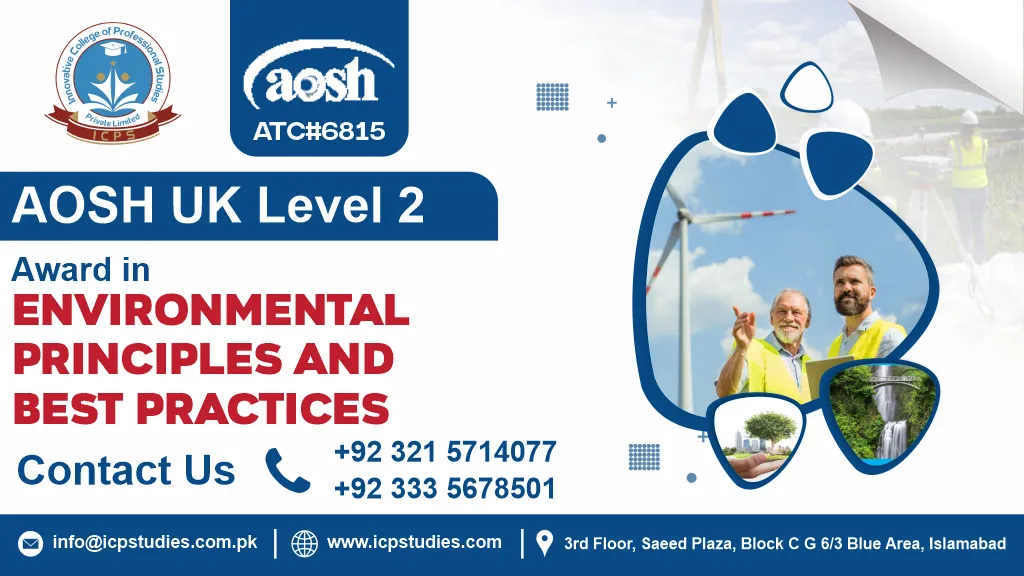Elevate Your Expertise with AOSH UK Level 2 Award in Environmental Principles & Best Practices!
Unlock the Gateway to a Greener Future!
Are you ready to stand out in your industry, make a positive impact on the environment, and boost your career prospects? Look no further than the AOSH UK Level 2 Award in Environmental Principles & Best Practices!
Why Choose AOSH UK?
Internationally Recognized Certification: Gain a credential that opens doors worldwide, demonstrating your commitment to environmental stewardship.
Comprehensive Curriculum: Dive deep into the essential principles and best practices that empower you to make informed decisions and drive sustainable initiatives.
Expert Guidance: Learn from seasoned professionals who bring real-world experience to the classroom, providing you with practical insights and strategies.
Flexible Learning Options: Our program is designed to fit seamlessly into your schedule, allowing you to balance work, life, and education.
What You’ll Gain:
In-Depth Environmental Knowledge: Master the fundamentals of environmental science, policies, and sustainable practices that will set you apart in your field.
Practical Skills Application: Acquire hands-on experience in implementing environmental best practices, ensuring you can make an immediate impact in your workplace.
Global Perspective: Understand the interconnectedness of environmental issues on a global scale and learn strategies to address them effectively.
Professional Recognition: Showcase your dedication to environmental responsibility and position yourself as a leader in your industry.
Career Advancement Opportunities: Open doors to new career paths and advancement opportunities as organizations increasingly prioritize sustainability.
Ready to Transform Your Career?
Invest in your future and the planet with the AOSH UK Level 2 Award in Environmental Principles & Best Practices. Join us on the journey towards a sustainable and thriving future.
Enroll today and become a catalyst for positive change!
All About AOSH UK Level 2 Award in Environmental Principles & Best Practices
Course Overview
Environmental principles and best practices encompass a set of guidelines and standards aimed at reducing environmental impact and promoting sustainability. A Level 2 award indicates an intermediate level of qualification, likely covering foundational concepts and practical applications in environmental practices.
Potential topics that may be covered in a course with this title include:
- Environmental Principles: Understanding fundamental environmental concepts such as biodiversity, ecosystems, and human impacts on the environment.
- Best Practices: Identifying and implementing sustainable resource management techniques, waste reduction strategies, and energy efficiency measures.
- Legislation and Compliance: Learning about environmental laws, regulations, and standards, and ensuring compliance across various industries.
- Risk Assessment: Understanding methodologies for assessing and managing environmental risks to facilitate effective environmental management.
- Environmental Management Systems: Introduction to frameworks like ISO 14001, which provide systematic approaches to environmental responsibility within organizations.
- Case Studies and Practical Applications: Using real-world examples and case studies to demonstrate the application of environmental principles and best practices across different industries.
It’s essential to note that the specifics of the AOSH UK Level 2 Award in Environmental Principles & Best Practices may vary. For the most accurate and up-to-date information on the content and requirements of this qualification, individuals should consult directly with AOSH UK or the relevant training provider.
Learning Outcomes
The learning outcomes for the “AOSH UK Level 2 Award in Environmental Principles & Best Practices” are designed to equip learners with the knowledge and skills necessary to understand and apply environmental principles and best practices. Upon successful completion of the course, participants should be able to:
- Define Environmental Principles:
- Clearly articulate the fundamental principles that govern environmental sustainability and management.
- Identify Environmental Legislation and Regulations:
- Demonstrate a comprehensive understanding of relevant environmental laws and regulations applicable to different industries.
- Describe the Impact of Human Activities on the Environment:
- Analyze and evaluate the various ways human activities can impact the environment, including pollution, resource depletion, and habitat destruction.
- Explain the Concept of Environmental Management Systems (EMS):
- Understand the purpose and components of Environmental Management Systems, including their role in fostering sustainable practices within organizations.
- Recognize Environmental Risks and Hazards:
- Identify potential environmental risks and hazards associated with specific activities, products, or processes, and propose measures to mitigate or eliminate them.
- Promote Resource Efficiency and Waste Reduction:
- Develop strategies to enhance resource efficiency and minimize waste generation in line with environmental best practices.
- Demonstrate Knowledge of Sustainable Practices:
- Illustrate an awareness of sustainable practices and their integration into daily operations to minimize the ecological footprint of organizations.
- Implement Environmental Best Practices:
- Apply learned principles and strategies to implement environmental best practices in a practical setting, fostering a culture of sustainability.
- Evaluate Environmental Performance:
- Develop skills to assess and measure environmental performance using relevant indicators and metrics.
- Communicate Environmental Responsibilities:
- Effectively communicate environmental responsibilities to various stakeholders, promoting awareness and understanding of the importance of sustainable practices.
- Participate in Environmental Improvement Initiatives:
- Actively engage in environmental improvement initiatives, collaborating with colleagues to contribute to ongoing efforts toward sustainability.
- Understand the Importance of Continuous Improvement:
- Embrace the concept of continuous improvement in environmental management, recognizing the need for ongoing assessment and refinement of practices.
These learning outcomes aim to provide participants with a solid foundation in environmental principles and best practices, empowering them to contribute positively to the sustainable development of organizations and communities.
To enroll in the AOSH UK Level 2 Award in Environmental Principles & Best Practices, candidates typically need to meet the following entry requirements:
- Age Requirement: Candidates must be at least 14 years old.
- Educational Background: No formal qualifications are required, but a basic understanding of environmental issues is beneficial.
- Language Proficiency: Proficiency in English, both written and spoken, is necessary for understanding course materials and completing assessments.
- Commitment: Candidates should be willing to actively participate in the course and complete any required assessments.
- Experience: While not mandatory, prior experience or interest in environmental practices can enhance understanding of the course content.
It’s advisable to check with the specific training provider for any additional or specific requirements they may have.
The AOSH UK Level 2 Award in Environmental Principles & Best Practices is designed for various professionals, including:
- Employees: Individuals in any role looking to understand basic environmental principles and practices.
- New Starters: Those entering the workforce who need foundational knowledge of environmental issues.
- Supervisors: Team leaders seeking to improve their understanding of environmental best practices.
- Quality Control Staff: Individuals focused on maintaining environmental standards in their organizations.
- Anyone Interested in Sustainability: Individuals wanting to enhance their knowledge of sustainable practices and their impact on the environment.
This course is ideal for those looking to gain essential skills and knowledge to promote environmental responsibility in the workplace.
Key Takeaways
Study Units
Introduction to Environmental Principles
- Overview of Environmental Management
- Importance of Environmental Conservation
- Global Environmental Issues and Trends
- Legislation and Regulations Related to Environmental Protection
Environmental Impact Assessment
- Understanding Environmental Impact
- Conducting Environmental Impact Assessments
- Mitigation and Control Measures
- Case Studies on Environmental Impact Assessment
Sustainable Development Practices
- Principles of Sustainable Development
- Sustainable Resource Management
- Green Technologies and Innovations
- Corporate Social Responsibility (CSR) in Environmental Sustainability
Waste Management and Recycling
- Types of Waste and their Environmental Impact
- Waste Reduction and Recycling Strategies
- Legal and Ethical Aspects of Waste Management
- Implementing Effective Recycling Programs
Biodiversity and Conservation
- Importance of Biodiversity
- Threats to Biodiversity
- Conservation Strategies and Practices
- Role of Businesses in Biodiversity Conservation
Environmental Management Systems (EMS)
- Introduction to EMS (ISO 14001)
- Implementing an EMS
- Monitoring and Evaluation of EMS
- Continuous Improvement in Environmental Performance
Environmental Risk Assessment
- Identifying Environmental Risks
- Assessing and Prioritizing Environmental Risks
- Developing Risk Mitigation Strategies
- Case Studies on Environmental Risk Assessment
Best Practices in Environmental Management
- Industry-specific Best Practices
- Stakeholder Engagement in Environmental Management
- Environmental Reporting and Communication
- Success Stories of Organizations Implementing Best Practices
FAQs for AOSH UK Level 2 Award in Environmental Principles & Best Practices







